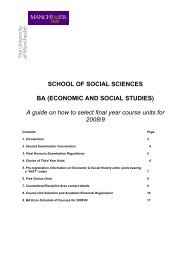CHNN 22, Spring 2008 - School of Social Sciences
CHNN 22, Spring 2008 - School of Social Sciences
CHNN 22, Spring 2008 - School of Social Sciences
Create successful ePaper yourself
Turn your PDF publications into a flip-book with our unique Google optimized e-Paper software.
they were marched out and the doors were locked behind them. It was a shameful episode, which<br />
really broke their hearts. They were loyal party members who’d gone through the procedure. But<br />
Eddie and I did not. I didn’t appeal. They then wrote and asked me for my party card, so I wrote a<br />
letter, which was published in the Morning Star, saying that they could expel me from the party,<br />
but my party card, which I’d then held for 45 or something years, was mine — and I kept it, and I<br />
have it. I have unbroken membership.<br />
The need to save the party, to keep the party going, was why the CPB [Communist Party <strong>of</strong> Britain]<br />
was formed, to ‘reclaim the party’, because we could see it disappearing. Don’t forget that these<br />
comrades had been working together, albeit it in local branches, as a district, and people had<br />
known each other for years, at [Morning Star] Bazaars, the Free Trade Hall, been on May Day<br />
parades and demonstrations, and were very close comrades who saw the need to keep together, to<br />
maintain the branch name if nothing else, which is all we have done. I mean, at some stage in life, if<br />
there is a need for a communist party, or if a party is formed which is called ‘the Communist Party’<br />
— it’s there. It doesn’t need to be the same communist party, or the same comrades in it, but the<br />
communist party has been maintained, and that was the intention <strong>of</strong> the CPB.<br />
The emergence <strong>of</strong> perestroika and glasnost initially led to a renewal <strong>of</strong> enthusiasm. I don’t think it<br />
manifested itself in recruitment particularly. I haven’t the figures on that, I don’t really know.<br />
Certainly, I think, everybody really hoped that that was something that was happening. Looking<br />
back I can realise that we were terribly slow to recognise and react to obvious signs. We never<br />
believed that there was anything [seriously amiss] going on in the Soviet Union, when there<br />
obviously was. Although, everybody knew that the whole <strong>of</strong> the politburo had been obliterated, and<br />
so on and so forth. But somehow or other we were always able to rationalise that. I don’t know why.<br />
Misplaced loyalty? Which is one reason why I say I don’t think we were particularly successful over<br />
the century.<br />
The British party always was a conglomeration <strong>of</strong> individuals, obviously. And from time to time<br />
there were splits <strong>of</strong>f in one way or another. There always had been schisms. It’s a feature <strong>of</strong> the left<br />
— it does fragment. But I would say I don’t think it was that there were simply ‘two factions’, and<br />
also comrades who’d remained in the Democratic Left I’m perfectly friendly with and there’s never<br />
been antagonism on their part, although there has been on the part <strong>of</strong> some others. The library has<br />
been, I think, a cohesive factor, hopefully. It’s also that comrades come here like bee to a honey pot.<br />
Because there isn’t a district or an ‘organisation’ that’s seen as such, a lot <strong>of</strong> people come to the<br />
library as friends and helpers and so on, because they see it as a progressive organisation.<br />
I still have absolute confidence. No question. What annoys me most is when people talk about the<br />
Soviet Union as if it were communist, or even socialist — which it certainly wasn’t — as if a socialist<br />
society would inevitably suffer the same drawbacks that that did. It’s not so. We’ve got to find the<br />
way. In the back <strong>of</strong> my mind I’ve got a feeling it can’t be done in huge conurbations, in huge<br />
numbers. It’s got to be broken down, because it’s got to be democratic. People have got to<br />
participate. And unless you have it in small enough numbers so that everybody can participate,<br />
then you don’t get socialism. And if you have it in such a way that you get delegates, who are<br />
delegated; who are delegated; who are delegated, you get the ‘pr<strong>of</strong>essional delegates’, who then<br />
become your pr<strong>of</strong>essional bureaucrats.<br />
I don’t believe that the British communist party has ever been democratic — in the terms that I<br />
consider democracy. It has been centralist, yes, but not democratic centralist. I don’t think that<br />
there is such a thing as ‘democratic centralism’. I accept that in an illegal situation, it may be<br />
necessary to have centralism. But we’re not illegal and never have been, and we shouldn’t have<br />
gone along those lines. And we’re still making the mistake. It was a handicap to the party, that way<br />
<strong>of</strong> organising.<br />
43
















